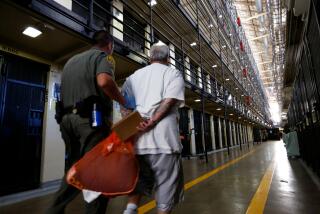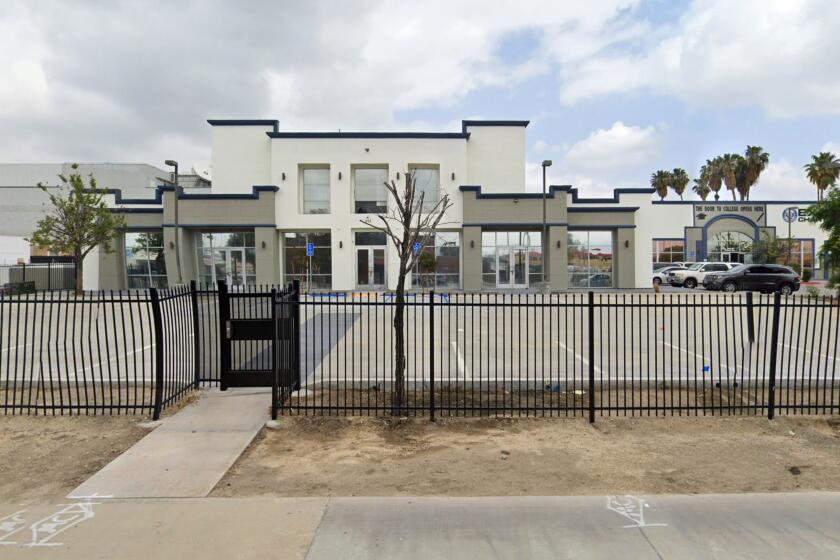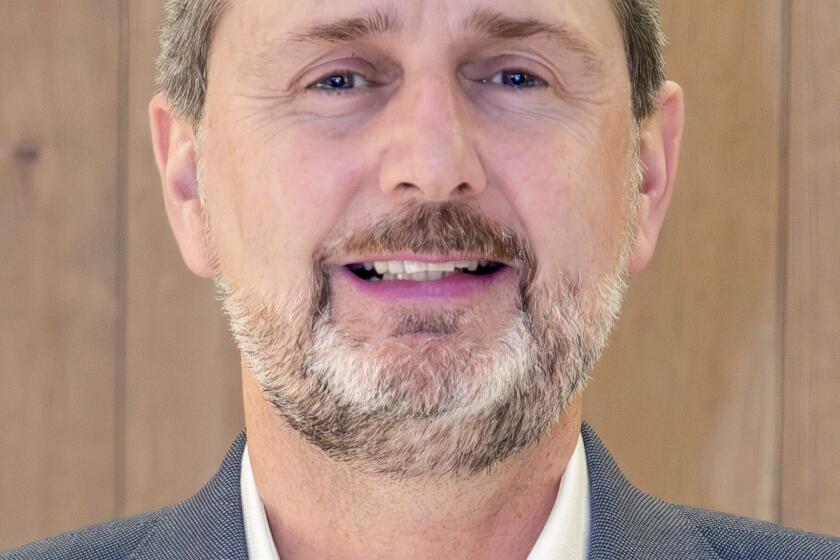Alternative program gives federal defendants a second chance
Nothing feels worse, Micheal Williams said, than having gun-toting officers with battering rams bust down your door at 6 in the morning to arrest you in your underwear in front of your 7-year-old son.
Standing behind glass in court with your arms and legs shackled as you await federal prosecution, he added, isn’t great, either.
“It was, like, I can’t believe I got myself into this,” the 30-year-old Navy veteran said on a recent Wednesday afternoon in a downtown Los Angeles courtroom.
When the Rowland Heights resident started altering money orders, he said, he was struggling to make ends meet. At the time, he was working as a community college basketball coach, clinging to hopes that he’d be able to work his way up to a full-time job. Soon, he said, he realized he’d made a terrible mistake.
Going through life as a felon? “I wouldn’t wish that on anybody,” he said.
Now, a unique program is giving Williams the chance to wipe the slate clean.
By successfully completing the intensive supervision program, people such as Williams, accused of less serious federal crimes, can avoid prison or even have their cases dismissed outright.
The pilot program, Conviction and Sentence Alternatives, or CASA, allows select federal defendants throughout Southern California an opportunity to tackle whatever it was — drug addiction, mental illness or just plain bad decision-making — that may have led them to commit a crime, and to stay out of the criminal-justice system.
Though alternative sentencing programs have sprouted in hundreds of state courts over the last 25 years, such programs are newer and fewer at the federal level — and most deal exclusively with offenders who abuse drugs. CASA, federal court officials said, is the first program of its kind in the country.
Within the court’s Central District of California, which encompasses much of Southern California, it’s the first crack at a formal alternative sentencing program, aimed at keeping low-level offenders out of prison.
U.S. Atty. Andre Birotte said he sees CASA as “an example of breaking that vicious cycle of recidivism.”
Participants are required to first accept responsibility for their crimes, entering a guilty plea. Upon successful completion of the program, that plea will either be erased or result in no time behind bars, depending on the defendant’s history. Participants now in the program pleaded guilty to crimes including drug trafficking, perjury and bank robbery.
Once participants are accepted, they must show up in court at least every couple of weeks to meet with fellow CASA participants, a judge, assistant U.S. attorneys, public defenders and pretrial services officers. They must submit to random drug tests and check in regularly with their assigned pretrial services officer.
At a recent meeting, Sam Samudio, 55, who’d been facing five years in prison for dealing drugs, said he’d like to move to Idaho to be with his children once he completes the program. A woman whose young son fidgeted by her side and clambered over the courtroom’s wooden benches cheerily reported to Judge Dean Pregerson that she’d spent the past week applying for jobs at Costco and Sam’s Club.
A young man accused of making a false statement to a bank described his plans to graduate from law school.
As part of an exercise, he had been asked to envision where he’d be in two years. He said he hoped to be trying cases. “Kind of ironic, but fun,” he said with a wry laugh.
“If you want to defend cases in this courtroom, you have my support,” Deputy Public Defender Raul Ayala responded. “But if you’re prosecuting ...” He trailed off with a shrug.
Participants’ successes are met with applause from their cohorts and murmurs of encouragement from CASA team members. Their stumbles — missing Alcoholics Anonymous meetings, taking drugs — elicit a calm, firm line of questions about what they could have done or plan to do differently.
“You get the sense that people have never had positive role models, or have never gotten feedback on how to act,” Pregerson said.
Because the program was initiated with cooperation from agencies on all sides of a case, Assistant U.S. Atty. Steve Wolfe said the decision to essentially bet that a certain defendant will stay out of the criminal-justice system isn’t taken lightly. Program organizers screen hundreds of cases for those they think can beat the odds.
Ultimately, only a small number of defendants are accepted into CASA. About 50 of the 1,500 defendants whom the court’s pretrial services department supervises districtwide are in the program, officials said.
Any program that keeps people out of prison is a step in the right direction, said Berkeley law professor Frank Zimring.
Still, after decades of skyrocketing incarceration rates — in 1979, 44% of federal felony convictions went to prison, compared with 91% in 2008, Zimring said — programs like CASA are “trying to take a little nibble out of Godzilla.”
Judges have stressed the need to drastically rethink incarceration models. Experiments like CASA, even when they’re initially conducted on a small scale, not only have a ripple effect in the community but also save the government hundreds of thousands of dollars.
Birotte, too, said he has high hopes for CASA.
“All these kinds of projects start in pilot form,” he said. “Having gone to two graduations, I think the future is bright for this program.”
For Williams, CASA has been “like a life-saver.” He said he had never been in legal trouble before. He wasn’t addicted to drugs and hadn’t been accused of violence.
If he’d spent time in prison, he told his peers during a meeting, he’d have come out “a minimum-wage-job guy mad at the world.”
Instead, he said, he’s stayed with his sons.
As part of a CASA “homework” assignment, he was encouraged to make a list of goals. Among them was finding a steady job to support his kids and his girlfriend.
Sitting in Pregerson’s courtroom at a table typically reserved for lawyers on that recent Wednesday, Williams told his classmates he’d had a good couple of weeks.
The U.S. Postal Service, he said, had just hired him.
More to Read
Start your day right
Sign up for Essential California for news, features and recommendations from the L.A. Times and beyond in your inbox six days a week.
You may occasionally receive promotional content from the Los Angeles Times.






